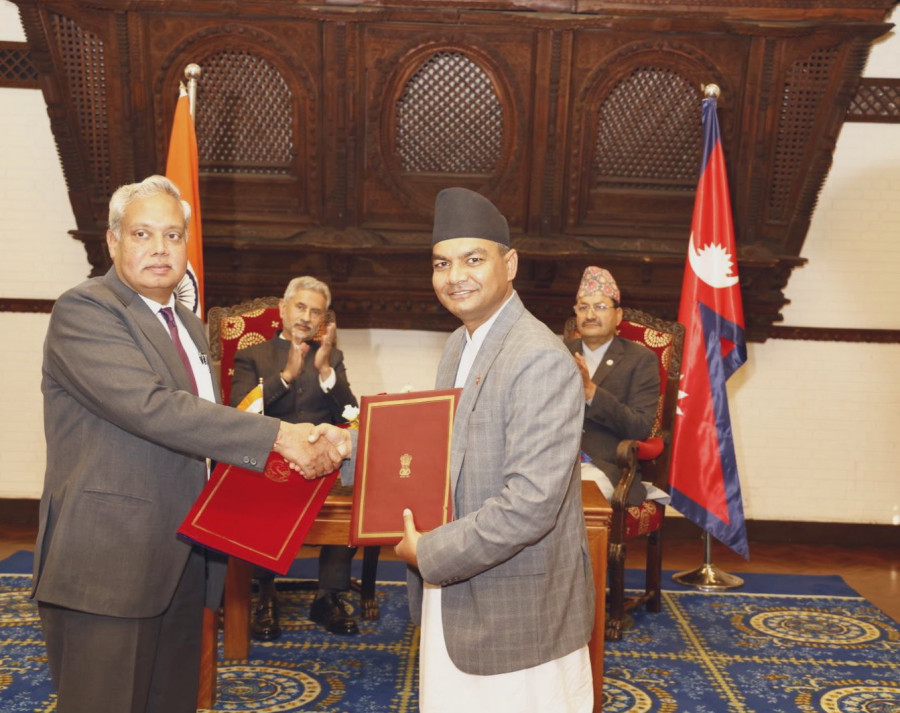National
Nepal signs deal with India to export 10,000 MW power in 10 years
Also other agreements have been signed on earthquake reconstruction, launch of satellites and on renewable energy.
Post Report
Nepal and India on Thursday inked an agreement setting the target to reach 10,000 megawatts of electricity export to India in the coming ten years.
Secretary for the Ministry of Energy, Water Resources and Irrigation Gopal Sigdel and Indian Energy Secretary Pankaj Agarwal signed a memorandum of understanding on the deal during a meeting at the Yak and Yeti Hotel in Kathmandu.
On September 5 last year, India had formalised its announcement that it would buy 10,000 megawatts of electricity from Nepal over 10 years with the endorsement of a long-term inter-government power trade agreement.
India’s Prime Minister Narendra Modi had announced during a joint press meet with Prime Minister Pushpa Kamal Dahal, during the latter’s visit to India, that the southern neighbour would buy 10,000 MW of electricity in the next 10 years from Nepal under the long-term power trade agreement.
“Under this agreement, we have set a target of importing 10,000 MW electricity from Nepal in the coming 10 years,” Modi had said in the joint press meet on June 1 last year.
The energy deal was among the four agreements signed on Thursday.
According to Amrit Rai, spokesperson at the Ministry of Foreign Affairs, India has also agreed on Rs10 billion financial aid to Nepal for the reconstruction in Jajarkot and Rukum West which were worst hit by the earthquake in November.
Likewise, an agreement has been reached for the launch of Nepali satellites between the Nepal Academy of Science and Technology and NewSpace India Limited under the Indian Space Research Organisation.
Similarly, a memorandum of understanding for cooperation in renewable energy has also been signed by the Nepal Electricity Authority and National Thermal Power Corporation (NTPC) Limited, India.
The two ministers also jointly inaugurated three cross-border transmission lines.
Meanwhile, a group of rights activists and former bureaucrats have criticised the agreement reached between the two countries. They termed the energy deal a problematic one.
“We find the decision to guarantee 10,000 MW of Nepal's hydroelectricity for the Indian market problematic, as this also affects Nepal's flexibility in relation to stored water as a natural resource,” read a statement jointly signed by them. “Because hydropower is not just a tradeable commodity but also intrinsically linked to the use of water as a resource, we demand that decisions be reached only through wide national discussion and parliamentary oversight.”
Former chief commissioner of the Commission for Investigation of Abuse of Authority (CIAA) Surya Nath Upadhyay, former commissioner of National Human Rights Commission Sushil Pyakurel, senior journalist Kanak Mani Dixit, Dr Renu Adhikari and Hira Bishwokarma are the signatories of the statement issued immediately after the signing of the bilateral agreement.
They also claimed that Thursday’s agreements were bound to weaken Nepal's independent and sovereign agency on bilateral matters. “We also protest the Dahal Government's reaching agreements with New Delhi in a secretive manner without adequate information provided to the polity and the general public,” the statement said.




 8.67°C Kathmandu
8.67°C Kathmandu














